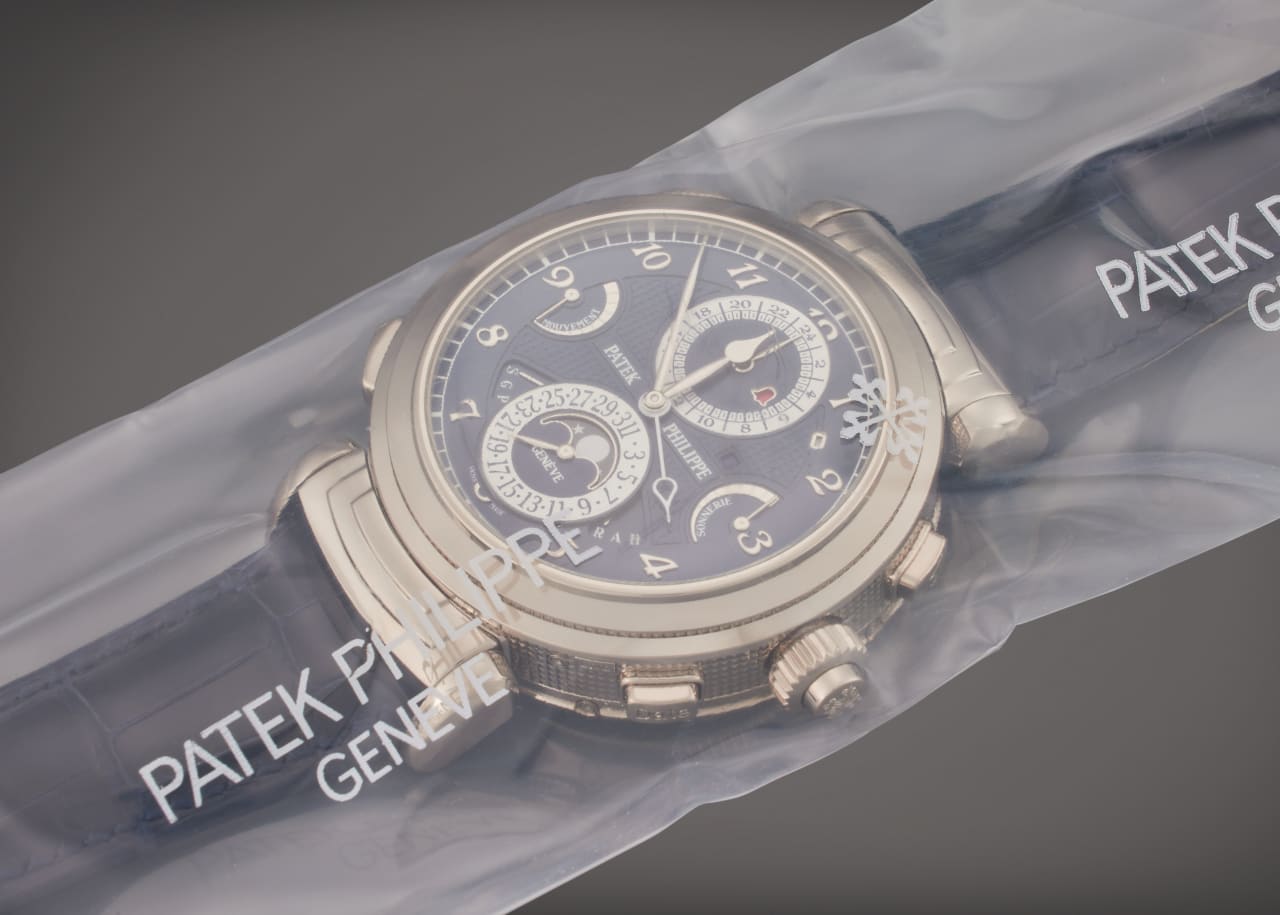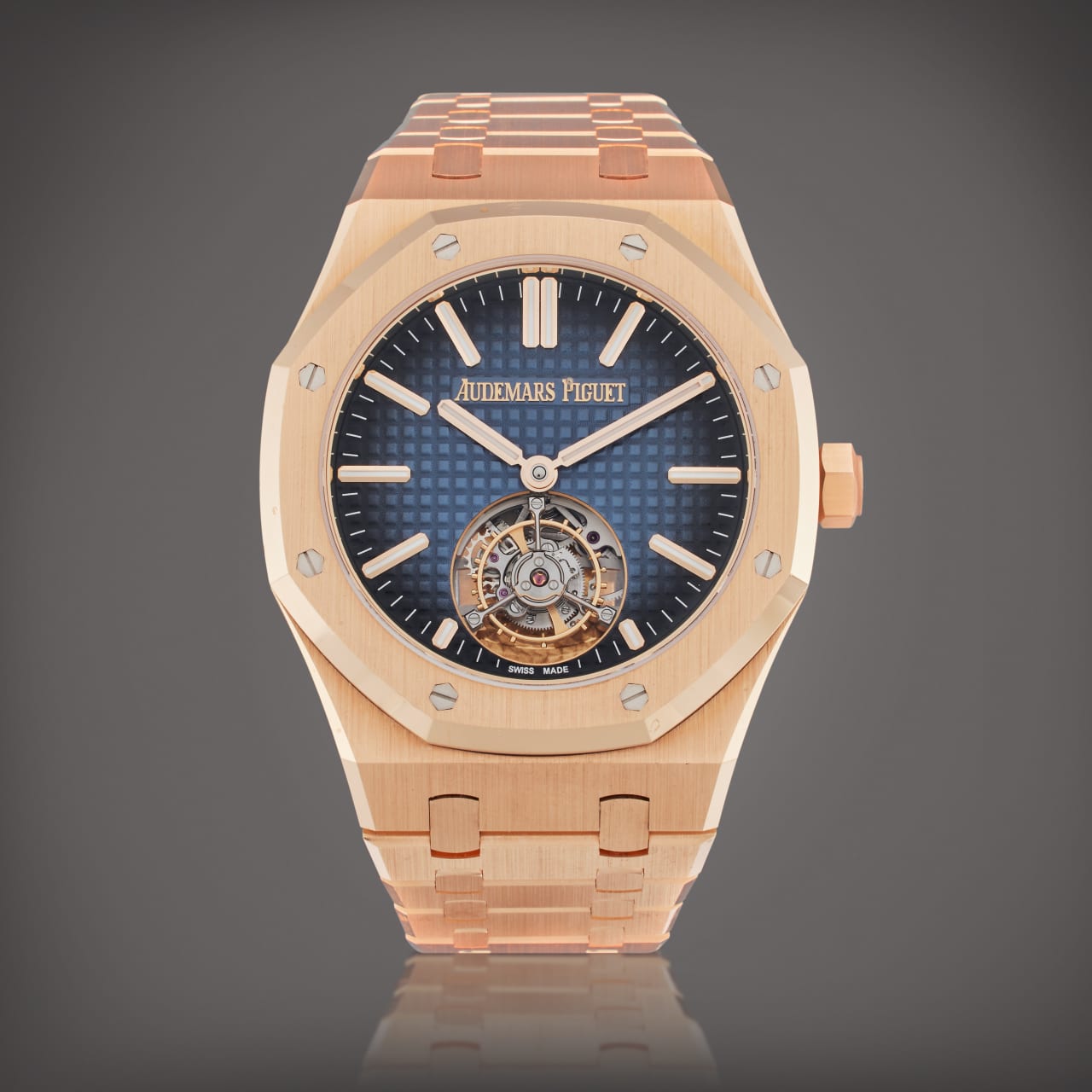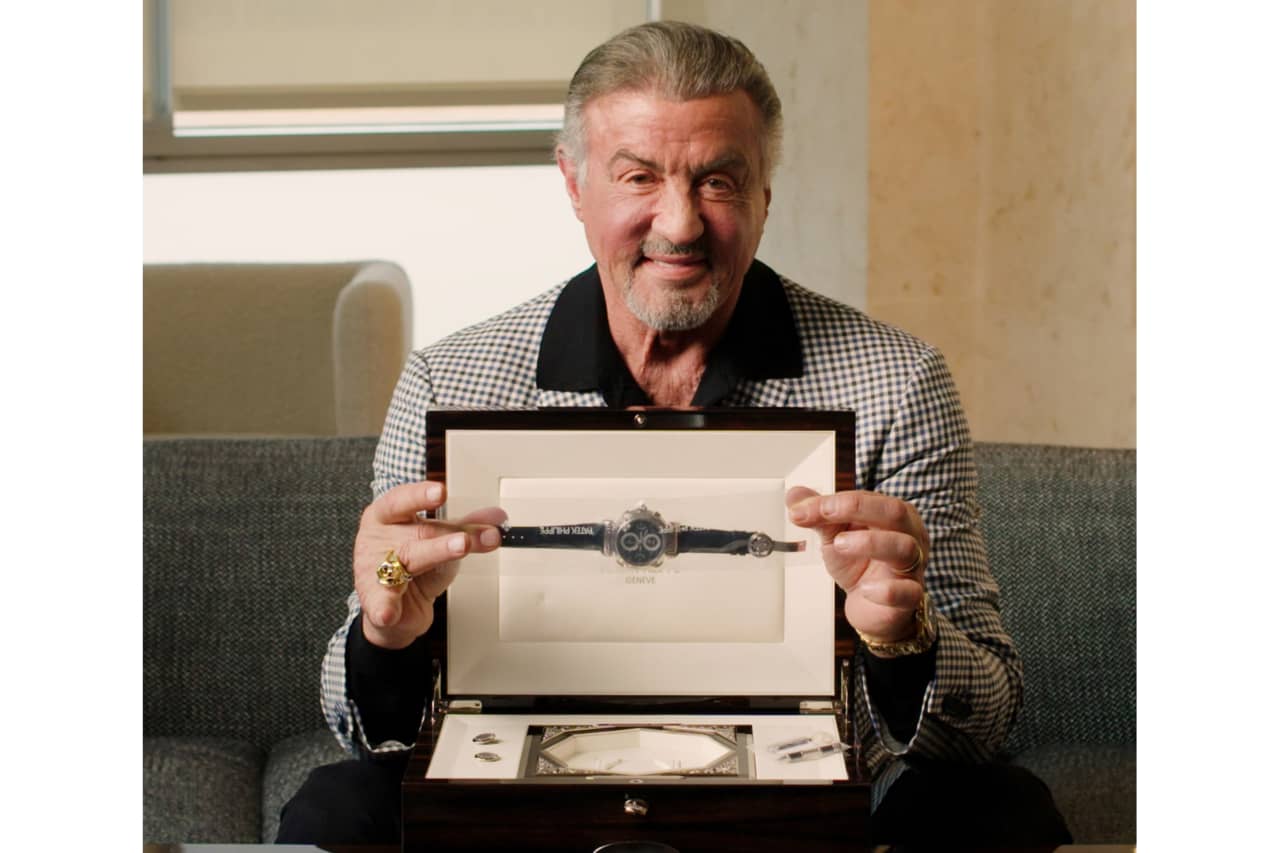Sylvester Stallone’s legacy as one of the most notable watch collectors of the 21st century was cemented in New York this week, as 11 of the actor’s timepieces sold for US$6.7 million—beating its presale estimate—at Sotheby’s.
The highlight of the sale was the Academy Award winner’s Patek Philippe Grandmaster Chime, which sold for US$5.4 million (surpassing its pre-sale estimate of US$2.5 million to US$5 million), a result that set a pair of benchmarks for the auctioneer. It’s the third-most valuable wristwatch sold in Sotheby’s history, and marks a record for a modern watch sold by Sotheby’s, topping the US$4.5 million sale of a Richard Mille Reference RM53-02 last October.
“The sale of the Patek Philippe Grandmaster Chime was an unrepeatable celebration, not only of a masterpiece by the most revered Swiss-watchmakers of technical excellence, but also of the legendary icon that is Sylvester Stallone, who has been a deeply influential and admired collector for many decades,” Geoff Hess, Sotheby’s head of watches, Americas, said in a statement.

Sotheby’s
On Wednesday, more than 100 attendees filled Sotheby’s saleroom, and once the Grandmaster Chime (Reference 6300G-010) hit the block, a four-minute bidding war ensued among five bidders, according to the auction house. In the end, the watch was sold to a private collector from Asia. ( Stallone paid US$2.2 million for the watch in 2021. )
“To feel the pulse of collectors racing with excitement in pursuit of absolute top-caliber material was tremendous, and an homage to the art of collecting at the highest level,” Hess said.
Considered to be a holy grail among followers of haute horology, the Grandmaster Chime was the result of a project initiated by Philippe Stern in 2007 to create the most intricate wristwatch in the brand’s history. The development, production, and assembly spanned 100,000 hours, according to Sotheby’s.
Stallone’s Grandmaster Chime was the first example of the model to appear at auction, aside from one specifically created for, and sold at, a Christie’s charity auction in November 2019 for CHF 31 million (US$35 million) . It remains the highest price for a watch ever sold at auction.
Hess himself went home with one of Stallone’s watches, as the winner of a five-minute bidding battle for the actor’s olive green Patek Philippe Nautilus. The 2021 stainless steel watch featuring an olive-green dial and diamond-set bezel sold for US$492,000, exceeding its pre-sale estimate of US$400,000.

Sotheby’s
Stallone’s collection, assembled over the course of more than 20 years, also included timepieces from Rolex, Audemars Piguet, and Piaget, as well as unique and screen-worn watches from Panerai.
Other highlights included the actor’s Audemars Piguet Royal Oak Tourbillon (Reference 26730OR.OO.1320OR.01)—a gorgeous piece created for the 50th anniversary of the Swiss watchmaker’s Royal Oak collection in 2022. It sold for US$228,000, exceeding its pre-sale high estimate of US$200,000; and a Panerai Luminor Submersible (Reference PAM00382) worn by Stallone in the 2012 film The Expendables 2 that sold to an online buyer for US$96,000, blowing past its pre-sale estimate of US$30,000 to US$60,000.
“I enjoy the collecting process like so many others in this passionate community, who don’t just see watches as an accessory, but admire them for their history, craftsmanship, artistry—but most importantly—how they make them feel,” Stallone said in a statement when the sale was announced. “Looking at these watches, I feel truly lucky to have owned them; they serve as a reminder that hard work pays off.”
 Copyright 2020, Dow Jones & Company, Inc. All Rights Reserved Worldwide. LEARN MORE
Copyright 2020, Dow Jones & Company, Inc. All Rights Reserved Worldwide. LEARN MORE
What a quarter-million dollars gets you in the western capital.
Alexandre de Betak and his wife are focusing on their most personal project yet.
CIOs can take steps now to reduce risks associated with today’s IT landscape
As tech leaders race to bring Windows systems back online after Friday’s software update by cybersecurity company CrowdStrike crashed around 8.5 million machines worldwide, experts share with CIO Journal their takeaways for preparing for the next major information technology outage.
Be familiar with how vendors develop, test and release their software
IT leaders should hold vendors deeply integrated within IT systems, such as CrowdStrike , to a “very high standard” of development, release quality and assurance, said Neil MacDonald , a Gartner vice president.
“Any security vendor has a responsibility to do extensive regression testing on all versions of Windows before an update is rolled out,” he said.
That involves asking existing vendors to explain how they write software, what testing they do and whether customers may choose how quickly to roll out an update.
“Incidents like this remind all of us in the CIO community of the importance of ensuring availability, reliability and security by prioritizing guardrails such as deployment and testing procedures and practices,” said Amy Farrow, chief information officer of IT automation and security company Infoblox.
Re-evaluate how your firm accepts software updates from ‘trusted’ vendors
While automatically accepting software updates has become the norm—and a recommended security practice—the CrowdStrike outage is a reminder to take a pause, some CIOs said.
“We still should be doing the full testing of packages and upgrades and new features,” said Paul Davis, a field chief information security officer at software development platform maker JFrog . undefined undefined Though it’s not feasible to test every update, especially for as many as hundreds of software vendors, Davis said he makes it a priority to test software patches according to their potential severity and size.
Automation, and maybe even artificial intelligence-based IT tools, can help.
“Humans are not very good at catching errors in thousands of lines of code,” said Jack Hidary, chief executive of AI and quantum company SandboxAQ. “We need AI trained to look for the interdependence of new software updates with the existing stack of software.”
Develop a disaster recovery plan
An incident rendering Windows computers unusable is similar to a natural disaster with systems knocked offline, said Gartner’s MacDonald. That’s why businesses should consider natural disaster recovery plans for maintaining the resiliency of their operations.
One way to do that is to set up a “clean room,” or an environment isolated from other systems, to use to bring critical systems back online, according to Chirag Mehta, a cybersecurity analyst at Constellation Research.
Businesses should also hold tabletop exercises to simulate risk scenarios, including IT outages and potential cyber threats, Mehta said.
Companies that back up data regularly were likely less impacted by the CrowdStrike outage, according to Victor Zyamzin, chief business officer of security company Qrator Labs. “Another suggestion for companies, and we’ve been saying that again and again for decades, is that you should have some backup procedure applied, running and regularly tested,” he said.
Review vendor and insurance contracts
For any vendor with a significant impact on company operations , MacDonald said companies can review their contracts and look for clauses indicating the vendors must provide reliable and stable software.
“That’s where you may have an advantage to say, if an update causes an outage, is there a clause in the contract that would cover that?” he said.
If it doesn’t, tech leaders can aim to negotiate a discount serving as a form of compensation at renewal time, MacDonald added.
The outage also highlights the importance of insurance in providing companies with bottom-line protection against cyber risks, said Peter Halprin, a partner with law firm Haynes Boone focused on cyber insurance.
This coverage can include protection against business income losses, such as those associated with an outage, whether caused by the insured company or a service provider, Halprin said.
Weigh the advantages and disadvantages of the various platforms
The CrowdStrike update affected only devices running Microsoft Windows-based systems , prompting fresh questions over whether enterprises should rely on Windows computers.
CrowdStrike runs on Windows devices through access to the kernel, the part of an operating system containing a computer’s core functions. That’s not the same for Apple ’s Mac operating system and Linux, which don’t allow the same level of access, said Mehta.
Some businesses have converted to Chromebooks , simple laptops developed by Alphabet -owned Google that run on the Chrome operating system . “Not all of them require deeper access to things,” Mehta said. “What are you doing on your laptop that actually requires Windows?”















